
Water and Sewer

The Region of Durham operates and maintains our water and sewage infrastructure. We supply safe drinking water to customers across the region. We oversee the municipal sanitary sewage systems and help connect existing or future homes to the sanitary sewer system or the water supply system.
Watch our Water Champions video to learn more about how the Region treats sewage before it is returned to the environment.
Many rural residents have private water wells and septic systems.
|
Regional water |
|
Our Works Department treats and distributes safe drinking water across the region. They do it in the most cost-effective way. Municipal water and sanitary sewer services are 100 per cent rate-supported. Property taxes do not fund this program. About 95 per cent of Durham's municipal tap water comes from Lake Ontario. The rest comes from underground sources and Lake Simcoe. A sophisticated system processes the water. We test the water daily to make sure it is safe to drink. Our staff monitors Durham's municipal water plants. The Ministry of the Environment and Climate Change inspects the plants. Top three reasons to choose tap water:
|
|
Why are municipal water and sewer user rates increasing? |
|
Providing clean and safe water is complicated and costly. Water conservation is important to protect this important and limited resource. Water conservation can help to extend the life of our municipal water system. There are fixed and planned expenses associated with treating and distributing water and sewage across Durham. They remain the same, regardless of the amount of water used. These costs support the entire system needed to supply water or treat sewage now and in the future: OperationsAlmost 90 per cent of the operating costs for water supply and sanitary sewerage are fixed services. These costs do not change regardless of how much water is used. They include:
SafetySome of the user rates increases are because of the increased operating cost. They have increased because of new regulations introduced by the Province of Ontario. It is important to maintain these systems to protect the health of those who live, work and play in Durham Region. Not maintaining the systems would put the Region at risk for:
GrowthDurham Region's population is estimated to double within 20 years. We will need new water supply plants and upgrades to the older water supply system. We can delay building new plants and avoid costly modifications through water conservation. These program increases relate to replacement and growth. They will eventually be required as the water and sewer system age. DebtDebt repayment for water pollution control plants affects the water and sanitary sewer user rate. We need new and expanded plants to meet regulatory and replacement needs for water and sewer systems. |
|
The sanitary sewer is a system of underground pipes. It moves sewage from the plumbing of homes and businesses to a water pollution control plant. The sewage is treated and cleaned. It goes into local waterways, such as lakes and streams. Items that are not human waste, water or toilet paper can cause flooding in your home or business. They can cause blockages and backups in our sewer system. Both are costly to repair. On July 1, 2022 the updated Sewer User-Rate By-law came into effect. View a copy of the updated Sewer User Rate By-law. Think Before You FlushOur sanitary sewer system is not designed to dispose of anything beyond human waste, toilet paper or wastewater. You should not flush any other items, even if they claim to be flushable. Some items, such as cotton balls, disposable wipes and feminine hygiene products may appear easy to flush down the toilet. They can cause the sanitary sewer system to become blocked and should be disposed of in the garbage. Wipes in your pipesBathroom wipes, seen as an alternative to toilet paper, are often advertised as flushable. Do not flush wipes down the toilet. These wipes do not break down the way toilet paper does. They can clump together in the sewer system and cause blockages and back ups. Even if they are labelled as flushable, disposable wipes should be put in the garbage. The three Ps of flushingThe only things that should be flushed down toilets are the three Ps:
Small amounts of soapy water are also acceptable.
|
|
Fat, oil and grease disposal |
|
When you cook with fat, oil and grease (FOG), do not dispose of it down the sink or flush it down the toilet. Even though it might be a liquid form when you dispose of it, it can turn solid when it enters the cold sewer system and can accumulate inside sewer pipes. When FOG meets other items in the sewer system that should not be flushed (such as rags and wipes), it can form large clumps or balls. This can cause major sewer clogs. The use of hot water and detergent does not prevent these problems. To responsibly dispose of fat, oil and grease:
|
Contact Us





 The following is a list of items that should not be flushed down the toilet:
The following is a list of items that should not be flushed down the toilet: